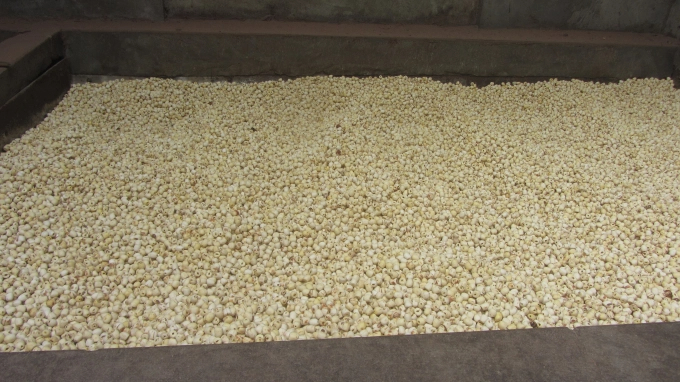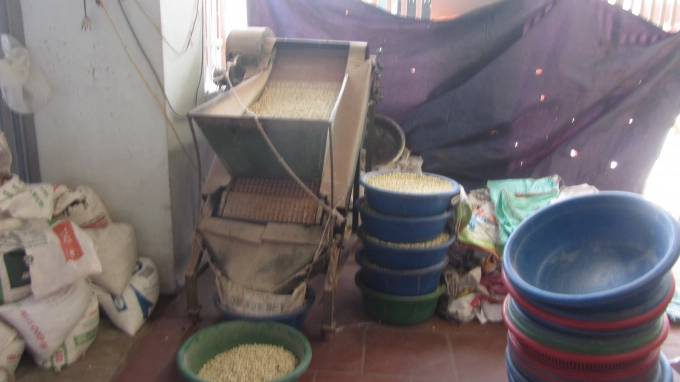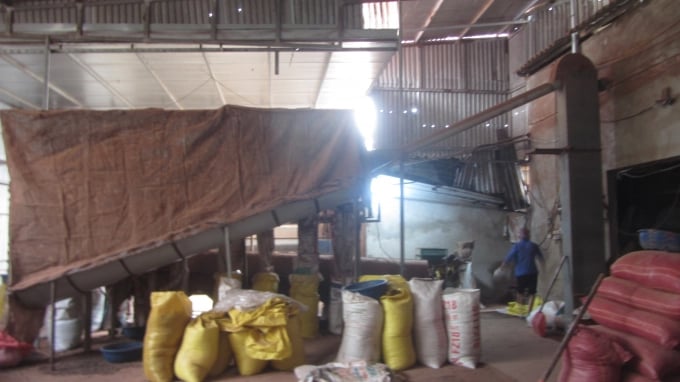May 21, 2025 | 05:05 GMT +7
May 21, 2025 | 05:05 GMT +7
Hotline: 0913.378.918
May 21, 2025 | 05:05 GMT +7
Hotline: 0913.378.918

Lotus seeds after preliminarily processed. Photo: HT.
In the communes of Hong Nam, Lien Phuong, Quang Chau, Tan Hung, and Phuong Chieu, 30 small and medium-sized facilities specialize in lotus seed processing, according to Mr. Le Van Thang of the Hung Yen Subdepartment of Rural Development.
These facilities produce and distribute around 10,000 tons of bare lotus seeds yearly, producing between VND 1 trillion and VND 1.5 trillion annually. The manufactured goods are sold domestically and exported to South Korea and China. In 2020, the bare kernels are rated 4-star OCOP. This has supplied tens of thousands of people with employment and a steady income.
"Hung Yen is one of the few locations where bare lotus seeds are still mass-produced. Previously, the Dinh Bang commune in Bac Ninh used to process lotus seeds, but was unable to maintain the industry due to the sluggish pace of technological change. Mr. Thang stated that a few facilities outside the province have come in Hung Yen to gain expertise, but the size is modest and the production is insignificant.
Mr. Trinh Van Hung, a 90-year-old Hung Yen native, stated that the practice of processing lotus seeds had lasted for around two centuries. Not until the 1980s of the previous century did the bare lotus seed acquire economic value. However, because it was created manually and in fragments, the yearly output of bare lotus seeds was less than 100 tons.

A lotus seed peeling machine. Photo: HT.
As of 2010, the lotus seed processing procedure has been mechanized due to the growth of the agricultural business, which has facilitated the transfer of sophisticated technology. The output has multiplied and labor capacity has expanded tenfold as a result. Also as a result of the lotus seed auto-production chain, the participants have been reorganized so that households with a large consumption market or cooperatives and business households can connect with small production households to form a business or cooperative model specializing in lotus seed processing.
The case of Mr. Ha Van Lai in Hong Nam commune (city of Hung Yen) is a good example. In 1985, he worked as an freelance worker, harvesting lotus seeds for a local processing plant. He became the country's largest Lai Hoai lotus seed processing firm as a result of his bold commitment to invest in the improvement of production technological processes. This unit produces and supplies 3,000 to 4,000 kg of bare lotus seeds to the domestic market and exports an estimated VND 400 to 550 million each day, employing 1,000 locals.
Ms. Hoang Thi Ngoc, a representative of the Agricultural Office in Hung Yen, stated that at agricultural trade promotion fairs in Hanoi, 4-star OCOP lotus seeds are particularly popular with foreigners due to their tasty, healthy, and nutritive qualities, which qualify them as organic goods. Because processing raw materials are harvested from natural lakes and ponds (without the use of expensive fertilizers), food cleanliness and safety are always guaranteed. In addition, there is no need for chemicals or preservatives during manufacturing because the product is dried at high temperature settings. These are fundamental benefits of exporting lotus seeds to the U.S. and European markets, which boost economic value and boost production efficiency.
On the domestic market, lotus seeds are an essential meal for festivals, weddings, New Year's Day, the full moon week before the first day of the first lunar month, and the first day of the first lunar month... With several unique, tasty, and appealing processing techniques, including lotus pie, lotus jam, sticky rice cooked with lotus seeds, and lotus simmering, among others. Particularly, longan lotus tea is a traditional delicacy of the Pho Hien.

Packing lotus seeds for export. Photo: HT.
In Southern and Northern herbal treatments, red lotus seed is an unique medicinal used to relax and feed the brain. After drying, the bitter germ is steeped in hot water and consumed as a highly efficient insomnia remedy. Dishes containing lotus seeds have the benefit of supporting pregnancy, beautifying the skin, preventing aging, and being beneficial for children.
The black shell of the seeds is used as fuel, the mixture of red film powder covered with seeds is used to fertilize fields, and lotus powder is fed to cattle. Additionally, shattered lotus pieces and the bitter germ are sold to traditional medicine pharmacies.
"The national yield of black lotus is insufficient to provide processing in Hung Yen." Therefore, tens of thousands of tons of black lotus seeds must be imported from Cambodia to meet local and international demand, according to Le Van Thang, director of the Hung Yen Rural Development Subdepartment.
Translated by Linh Linh

(VAN) In 2024, over 295 million people across 53 countries and territories faced acute hunger—an increase of almost 14 million people compared to 2023, while the number of people facing catastrophic levels of hunger reached a record high.

(VAN) World Environment Day 2025 (June 5) carries the theme 'Beat Plastic Pollution' continuing to emphasize the global urgency of addressing the plastic waste crisis.

(VAN) This was the assessment shared by experts at the workshop titled 'Assessing the Role and Potential of Low-Emission Rice Production Systems in Vietnam,' held on the morning of May 19.

(VAN) Cai Rong Port is the fisheries control center of Quang Ninh, helping to monitor fishing vessels, combat IUU fishing, and remove the EC's 'yellow card'.

(VAN) The German Agricultural Society (DLG) explores the possibility of establishing a mechanization service center in Vietnam’s Mekong Delta to support farmers in accessing and utilizing advanced machinery.

(VAN) On May 16, the Department of Water Resources Management, in collaboration with the Food and Agriculture Organization of the United Nations (FAO), held a signing ceremony for the GEF-8 project document.

(VAN) Food safety, mechanization, vocational training, and market opening are key areas of cooperation expected between the Vietnamese Government and the Federal Republic of Germany.